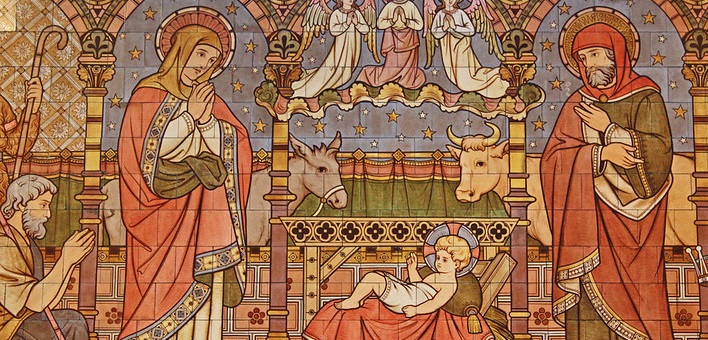Commentary on Isaiah 9:2-7
A “zealous” God.
Isaiah 9:2-7 (1-6 in the Hebrew) paints a picture of God’s zealousness, which results in the zealousness of God’s people. We take our lead from the final sentence of this reading, “The zeal of the Lord of hosts will do this.” Two things in particular are at issue here; what does the word “zeal” mean, and what is the “this” that the Lord will do?
First, as to the Lord’s “zeal.” Zeal, Hebrew qinʾa, most often has to do with jealousy or envy, at least in the negative sense. In Isaiah 11 jealousy is in parallel with hostility, taken as two motivations that are comparably hurtful:
The jealousy of Ephraim shall depart,
the hostility of Judah shall be cut off;
Ephraim shall not be jealous of Judah,
and Judah shall not be hostile towards Ephraim (Isaiah 11:13).
It seems that qinʾa is, as often as not, dangerous.
This is even the case when, according to Ecclesiastes, our envy or rivalry with others spurs us to achieve more, “Then I saw that all toil and all skill in work come from one person’s envy of another” (Ecclesiastes 4:4); this too, it seems, is “vanity and a chasing after wind.”
But there seems to be something different going on in the case of Isaiah 9:2-7. Here, the qinʾa of the Lord is an impassioning passion; in a good way.
Second, then, we take this sense of a positive zealousness from the “this” that the Lord will do. Working back from that final sentence we have the description of the promised child, so familiar and dear this time of year; he is the Wonderful Counselor, Wonderful God, Everlasting Father, and Prince of Peace (verse 6). This child brings with his birth the promise of the end to war; war-gear and the bloodied garments of war will burn, and the power of the oppressor will be lifted (verses 4-5). Skipping back past verse 3 for a moment, we have the promise of light in the face of darkness; the people who sat in darkness, who live in the land of “deep darkness” or the “land of the shadow of death” (verse 2; ṣalmawet, see also Psalm 23:4). The result of this promise of light in even the deepest and deadliest of darkness, the end of oppression and warfare, all made possible by the One Who Is to Come, accomplishes the “this” that is the heart and soul of this text:
You have multiplied the nation,
you have increased its joy;
they rejoice before you
as with joy at the harvest,
as people exult when dividing plunder (verse 3)
Joy / rejoicing / joy brings about the people’s exulting, celebrating exuberantly, their joy overflowing. I have put those three words, joy / rejoice / joy together because these are all base on the same Hebrew word (śimḥā / śāmǝḥû / śimḥā). Joy is, literally, multiplied in this verse: joy increased, leads to re-joy-cing, like those filled with joy. All of which leads to an exultant joy.
Moreover, the “exulting” of the people is described metaphorically: their joy will be like it is, “as people exult when dividing plunder.” Note that this metaphor is the answer to real oppression and war. Further war, further taking of plunder, further bloodshed, is not the answer to war, plundering, and bloodshed. The answer to all of this is joy, expressed in the face of it, because of the promise. Only peace can avenge violence. Only mercy can disarm wrath. Only love can answer hate. Only life can defeat death. And it is the qinʾa of the Lord that will do this.
In Isaiah as a whole this seems to be the result of the Lord’s qinʾa; the Lord’s qinʾa leads to a reversal of fortunes, in unexpected and joy-inspiring ways.
In chapter 26 the song that will be sung in the Promised Land will celebrate the promise that God will restore the people:
“O Lord, your hand is lifted up,
but they do not see it.
Let them see your zeal for your people, and be ashamed” (26:11).
In response to King Hezekiah’s prayer that the invading Assyrians be turned away, God answers Hezekiah’s prayer, saying, “concerning the king of Assyria: He shall not come into this city, shoot an arrow there, come before it with a shield, or cast up a siege ramp against it” (Isaiah 37:33). This will be prevented because, “The zeal of the Lord of hosts will do this” (Isaiah 37:32; see also the parallel story in 2 Kings 19:31, the only other two places this phrase occurs).
Again, in Isaiah 42:13, in between one stanza of the Servant Song (42:1-9) and the promise of restoration in Isaiah 43, the zealousness of the Lord is called upon joyously because,
The Lord goes forth like a soldier,
like a warrior he stirs up his fury (qinʾâ);
he cries out, he shouts aloud,
he shows himself mighty against his foes. (In this same vein see also Isaiah 59:17.)
God’s zealous love for God’s people is meant to inspire a similar, responsive love from God’s people. In response to injustice or violence, or any form of “darkness” visited upon God’s people, we too are called to qinʾa; not jealousy, or envy, or even “fury,” but a passion that brings, embodies, and invites joy.
And it begins with the birth of a child.


December 24, 2021